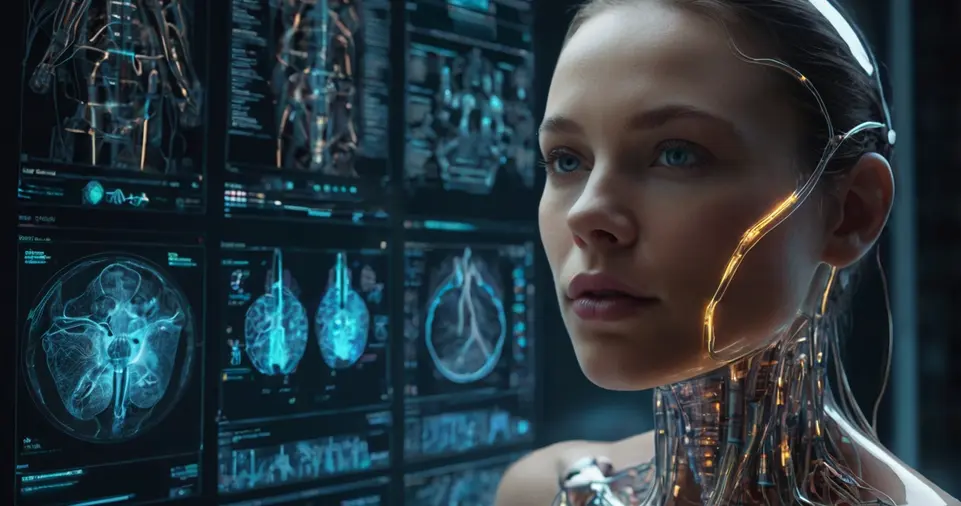Artificial Intelligence (AI) is rapidly transforming the healthcare industry, ushering in a new era of medical advancements and improved patient care.
With the integration of AI technologies, healthcare professionals are empowered to provide more accurate diagnoses, personalized treatment plans, and efficient management of patient data.
AI’s ability to analyze vast amounts of medical data, recognize patterns, and make data-driven predictions has proven invaluable in revolutionizing various aspects of healthcare, from diagnostics to drug discovery.
In this article, we explore the many ways AI is being used in healthcare for diagnosis and treatment.
From improving the accuracy of diagnostic tools to enhancing personalized medicine and robotic surgery, AI is playing a pivotal role in enhancing the quality of care.
Moreover, AI-driven solutions are helping reduce healthcare costs, improve patient outcomes, and increase access to healthcare services.
As AI technology continues to evolve, its role in healthcare will only expand, offering even greater potential for innovation in the medical field.
AI in Diagnostic Assistance
One of the most significant areas where AI is making an impact in healthcare is diagnostic assistance.
Traditionally, diagnosing diseases requires a healthcare provider to rely on their expertise, clinical observations, and sometimes even guesswork.
However, AI technologies are helping to make this process more accurate, efficient, and timely.
AI is particularly effective in medical imaging, pathology, and predictive analytics, areas that require the analysis of vast amounts of data to detect conditions early.
Medical Imaging
Medical imaging is one of the most vital diagnostic tools in modern healthcare. It involves the use of imaging technologies, such as X-rays, CT scans, MRIs, and ultrasounds, to visualize the internal structures of the body.
AI algorithms, particularly deep learning models, are capable of analyzing these images with high precision, often outperforming human radiologists in detecting abnormalities.
AI can identify patterns in medical images that may be too subtle for the human eye.
For example, it can detect early signs of cancer, heart disease, and neurological conditions in imaging data, leading to faster and more accurate diagnoses.
AI-powered tools can highlight areas of concern on X-rays or MRIs, allowing healthcare professionals to focus on these regions during their evaluations.
This can significantly improve diagnostic accuracy, reduce human error, and ultimately lead to earlier treatment interventions, which are critical for improving patient outcomes.
Pathology
AI is also being utilized in pathology, particularly for analyzing tissue samples and biopsy slides.
Pathologists examine these samples under a microscope to identify disease markers, such as cancer cells or bacterial infections.
AI tools are increasingly being used to assist pathologists in identifying these markers more quickly and accurately.
Machine learning models can be trained on large datasets of pathology slides to detect subtle changes in cell structure that could indicate the presence of disease.
For instance, AI can identify cancer cells in a biopsy sample by recognizing patterns associated with specific types of cancer.
By automating this process, AI can help pathologists make more accurate diagnoses and improve the overall efficiency of laboratories.
Predictive Analytics
Another area where AI is enhancing diagnostic capabilities is predictive analytics. By analyzing patient data, such as genetic information, medical history, and lifestyle factors, AI can predict the likelihood of certain diseases or conditions.
Predictive models are often used to identify patients at high risk of heart disease, diabetes, or stroke, enabling healthcare providers to intervene early and provide preventive care.
For example, AI can analyze a patient’s genetic data to predict their risk of developing specific diseases, such as Alzheimer’s or cancer, based on their family history and genetic predispositions.
AI-powered predictive analytics can also identify patterns in electronic health records (EHRs), alerting clinicians to potential risks and helping them make more informed decisions about patient care.
ALSO READ: How Autonomous Vehicles Work and Their Potential Impact
Personalized Treatment Plans with AI

AI is revolutionizing personalized medicine, where treatments are tailored to the individual characteristics of each patient.
By leveraging data from a variety of sources, such as genetic information, lifestyle choices, and environmental factors, AI can help create treatment plans that are customized to meet the unique needs of each patient.
Precision Medicine
Precision medicine is an approach to healthcare that takes into account individual differences in patients’ genes, environments, and lifestyles.
Traditional treatment methods often involve a “one-size-fits-all” approach, where treatments are designed based on the average response of a population.
However, AI allows for a more tailored approach by using data to predict how a specific patient will respond to various treatments.
For example, in oncology, AI can analyze genetic mutations in cancer cells to identify targeted therapies that are more likely to be effective for a particular patient.
By analyzing vast amounts of genetic data, AI can determine the best course of action for treating certain types of cancer, minimizing side effects and improving treatment outcomes.
This not only improves the patient’s chances of recovery but also reduces unnecessary treatments and costs.
Drug Discovery
AI is also transforming the process of drug discovery. Developing new drugs is a lengthy, expensive, and often uncertain process.
However, AI is streamlining this process by predicting how different compounds might interact with the body, identifying potential drug candidates, and suggesting ways to optimize drug development.
Machine learning algorithms can analyze vast datasets of molecular structures, biological information, and clinical trial data to identify patterns and make predictions about which compounds are most likely to be effective against a particular disease.
This significantly accelerates the discovery of new drugs and reduces the need for extensive trial-and-error testing.
AI-driven drug discovery also helps identify repurposed drugs—existing medications that may be effective for treating diseases other than their original intended use.
Treatment Optimization
Once a patient begins treatment, AI continues to play a vital role in monitoring and optimizing their care.
AI-powered systems can analyze real-time data from wearable devices, EHRs, and other health records to track the patient’s progress and suggest adjustments to their treatment plan.
For example, in the treatment of diabetes, AI can analyze a patient’s blood sugar levels and recommend changes to their medication or lifestyle to maintain optimal control over the condition.
AI can also be used to monitor patients undergoing chemotherapy, helping to predict potential side effects and adjusting treatment protocols accordingly.
This not only improves the patient’s quality of life but also maximizes the chances of successful treatment.
AI in Robotic Surgery
AI has also made significant advancements in the field of robotic surgery, where it is used to assist surgeons in performing complex procedures with greater precision and control.
Surgical Assistance
AI-powered robotic systems are capable of assisting surgeons in performing minimally invasive surgeries.
These systems provide real-time data, visualizations, and robotic arms that can execute precise movements with higher accuracy than human hands alone.
For example, robotic surgery systems are often used in procedures such as prostate surgery, heart bypass surgery, and gynecological operations.
These AI systems help surgeons by enhancing their dexterity and providing them with a 3D view of the surgical site.
They can also minimize human error, reduce the risk of complications, and shorten recovery times for patients.
AI-powered robots can perform repetitive tasks, such as suturing or tissue dissection, which can be time-consuming for human surgeons.
AI-Enhanced Surgery Planning
AI is also improving the planning stages of surgery. Advanced AI systems can analyze medical images and other patient data to simulate surgeries before they are performed.
This allows surgeons to plan the most effective and least invasive approach for each individual case.
By simulating the surgery in a virtual environment, AI can predict potential complications and help surgeons refine their techniques.
This results in more precise surgeries, fewer errors, and better outcomes for patients.
Virtual Health Assistants and Remote Monitoring

Virtual health assistants, powered by AI, are becoming increasingly popular in helping manage patient care remotely.
These AI-driven systems can assist patients with their healthcare needs, including diagnosis, treatment adherence, and ongoing monitoring.
Chatbots and Virtual Care
AI-powered chatbots are widely used in healthcare for initial consultations and basic patient queries.
These chatbots can assess a patient’s symptoms, provide information about their condition, and even recommend over-the-counter medications or lifestyle changes.
For example, chatbots can help patients determine whether they should seek further medical attention or whether their symptoms are mild and manageable at home.
Additionally, AI-based virtual assistants can assist patients with medication management by sending reminders to take their prescribed medications, answering questions about dosage, and providing personalized health tips.
This helps patients adhere to their treatment plans, especially in chronic disease management.
Remote Monitoring
Wearable devices, such as smartwatches and fitness trackers, are equipped with sensors that can collect real-time data on a patient’s health status.
AI algorithms can analyze this data to track vital signs, such as heart rate, blood pressure, and oxygen levels.
These systems can alert both patients and healthcare providers if any abnormalities are detected, enabling early intervention before a serious health issue arises.
Remote monitoring is especially valuable in managing chronic conditions like diabetes, hypertension, and heart disease, where constant monitoring and adjustment of treatment are essential for patient well-being.
AI in Clinical Decision Support
AI plays a crucial role in clinical decision support, providing healthcare professionals with valuable insights that guide their decisions in patient care.
AI in Electronic Health Records (EHRs)
AI systems are increasingly integrated into Electronic Health Records (EHRs), where they can help healthcare providers make more informed decisions.
AI algorithms can analyze a patient’s entire medical history, identifying trends and suggesting potential diagnoses or treatment options.
For instance, AI can alert doctors to potential drug interactions, suggest tests based on patient symptoms, and even predict the likelihood of a patient developing certain conditions in the future.
By streamlining this process, AI reduces the administrative burden on healthcare professionals and allows them to focus on delivering patient care.
This can also lead to more efficient use of resources and fewer unnecessary tests and procedures.
Predictive Models
AI predictive models are used to forecast a patient’s risk of developing certain conditions, such as heart disease, cancer, or diabetes.
By analyzing historical data, AI can provide doctors with insights into potential future health risks and help prioritize preventive care.
This proactive approach to healthcare can lead to better outcomes by detecting diseases early, when they are most treatable.
Conclusion
AI is transforming healthcare in ways that were once thought impossible. From diagnostic assistance and personalized treatment to robotic surgery and virtual health assistants, AI is improving accuracy, efficiency, and patient outcomes across the healthcare sector.
By harnessing the power of data and advanced algorithms, AI is enabling healthcare providers to deliver more tailored, effective, and timely care.
As AI continues to evolve, its role in healthcare will only grow, offering even greater possibilities for innovation, patient care, and the future of medicine.

